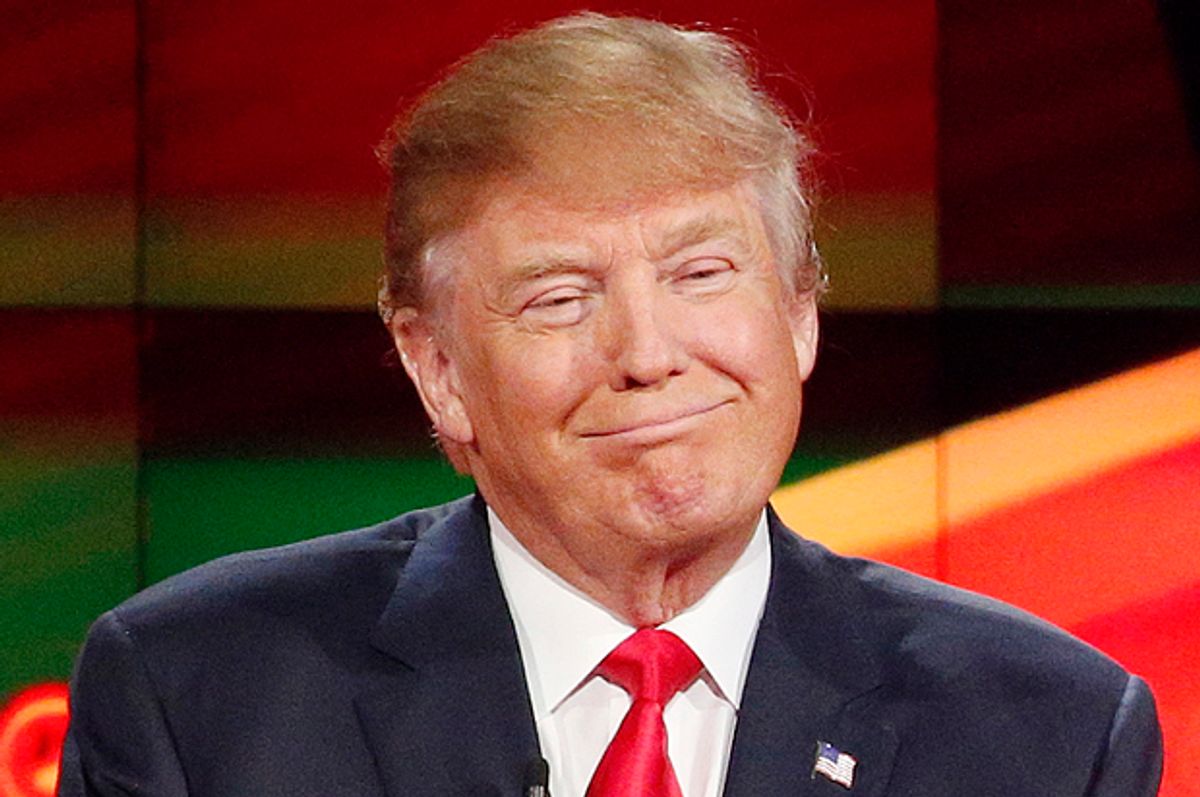 A great deal has been said about just what sort of person Donald Trump is. The consensus seems to be that he’s a narcissistic megalomaniac with a fourth-grade vocabulary. But as fabulous as Trump believes himself to be, he cannot singlehandedly elect himself.
A great deal has been said about just what sort of person Donald Trump is. The consensus seems to be that he’s a narcissistic megalomaniac with a fourth-grade vocabulary. But as fabulous as Trump believes himself to be, he cannot singlehandedly elect himself.
In a fascinating recent poll, a single characteristic emerged as the clearest sign that a voter is a Trump supporter. Contrary to what some might expect, it's not race, gender, income, age or education level. It's authoritarianism, clear and simple. Americans with authoritarian personalities (and they are more prevalent than any of us would like them to be) tend to support Trump.
This finding comes courtesy of a poll of 1,800 respondents conducted through the University of Massachusetts in Amherst, by Matthew MacWilliams. “I found that education, income, gender, age, ideology and religiosity had no significant bearing on a Republican voter’s preferred candidate,” MacWilliams writes in Politico this week. “Only two of the variables I looked at were statistically significant: authoritarianism, followed by fear of terrorism, though the former was far more significant than the latter.”
That Trump himself has authoritarian impulses won’t surprise anyone at this point. His call to round up and deport 11 million people, build a giant wall, and flat-out ban an entire religious group, as well as his apparent contempt for the First Amendment are all hallmarks of his campaign. This thin-skinned, vainglorious man has a propensity to eject journalists and protesters who offend him from his events and viciously lash out at anyone who criticizes him. He naively thinks that as president he might be able to just shut down parts of the Internet. He surrounds himself with sycophants. Former White House insider John Dean lays out an excellent case for Trump’s authoritarianism.
But Trump can’t elect himself, and his strong-man style and promises to restore America’s Greatness are obviously resonating with certain kinds of people, and now we know what kinds.
MacWilliams' poll asked whether it was more important for respondents if their children were "respectful or independent; obedient or self-reliant; well-behaved or considerate; and well-mannered or curious. Respondents who pick the first option in each of these questions are strongly authoritarian.”
No surprise then, that authoritarians yearn for a strong father figure in their leader. And as a quintessential authoritarian personality, Trump is also drawn to other authoritarians, like Putin, especially when they stroke his ego.
Other polls have noted that Trump supporters tend to skew male, older and white. Angry working-class voters are said to be powering both Trump’s (and Sanders’) rise. An article by John Judis in the National Journal laid out the similarity of Trump voters to segregationist George Wallace’s base of support in 1968, then Ross Perot and Pat Buchanan in 1992. Like Wallace did, Trump is polling well with people who are registered Democrats and Independents yet are increasingly identifying themselves as Republican."
In fact, according to the New York Times Upshot, “His very best voters are self-identified Republicans who nonetheless are registered as Democrats. It’s a coalition that’s concentrated in the South, Appalachia and the industrial North."
Trump’s support also spans different ethnicities to a greater extent than is typical of Republican presidential candidates. A recent poll has his support at 20 percent among African-American voters. His popularity among Latino voters is lower, which is unsurprising given his constant hammering away at immigrants, but still at 11 percent by one estimate. What may unite all these disparate voters is the authoritarian strain, which can be found in just about every ethnic group.
Authoritarians are not entirely confined to the Republican Party, though many have been migrating in that direction. During the 2008 Democratic primary, political scientist Marc Hetherington looked at the role authoritarianism played in the election and found it was more significant than income, ideology, gender, age and education in predicting whether voters preferred Hillary Clinton over Barack Obama. But according to MacWilliams’ current poll, the trait no longer plays a big role among Democratic voters, whereas, “49 percent of likely Republican primary voters I surveyed score in the top quarter of the authoritarian scale—more than twice as many as Democratic voters.” And though several of Trump’s GOP opponents could also be considered authoritarian types, Trump is the one whose support among these voters is “statistically significant.”
Want more reason to worry about a potential Trump presidency? MacWilliams also identified 39 percent Independents and 17 percent Democrats who scored high for authoritarianism. And there are many more Americans whose fears of a terrorist attack can be exploited by a tough-talking strongman. As MacWilliams told Politico, “Take activated authoritarians from across the partisan spectrum and the growing cadre of threatened non-authoritarians, then add them to the base of Republican general election voters, and the potential electoral path to a Trump presidency becomes clearer.”
And that’s the way it could happen here.

Shares